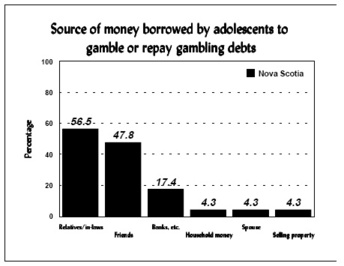On average, adolescents have less expendable money than adults. Recent studies, however, have found that adolescents have similar or higher rates of problem gambling than adults. To be classified as a pathological gambler by the DSM-IV*, a person must meet 5 or more of 10 specific criteria, or indications of problematic gambling. One of these criteria is borrowing money to gamble or to pay back gambling debts. Not surprisingly, borrowing is one way that adolescents can support their gambling activity. All studies that use instruments based on the DSM criteria (e.g., SOGS, MAGS) assess the extent of borrowing. Two recent Canadian studies used the SOGS to determine lifetime rates of levels of problem gambling. A Nova Scotia study** of adults and adolescents (13-17 years old) found that among pathological gamblers, adolescents were 9.6 times more likely than adults to have borrowed money and not paid it back as a result of gambling. Four (3.6) percent of the entire adolescent sample borrowed money to gamble or to pay for their gambling debts. Fifty seven (56.5) percent of the adolescents who borrowed money for gambling borrowed from relatives or in-laws. In an Ontario adolescent study***, 33% of the adolescent sample (12-19 years old) who gambled borrowed money from their parents or other relatives. In both studies family members are the primary source of money borrowed for adolescent gambling. These findings point to the importance of family awareness of adolescent gambling behaviors. Parents and others who lend money to adolescents may unknowingly be supporting gambling activity. This gambling activity may develop into disordered gambling behavior.
Sources adapted from:
*American Psychiatric Association. (1994). Diagnostic and statistical manual of mental disorders, Fourth Edition. Washington, D.C.: Author.
**Omnifacts Research Limited. (1993). An examination of the prevalence of gambling in Nova Scotia (Report #93090). Halifax, Nova Scotia: Department of Health, Drug Dependency Services.
***Insight Canada Research. (1994). An exploration of the prevalence and pathological gambling behaviour among adolescents in Ontario. Willowdale, Ontario: Canadian Foundation on Compulsive Gambling.
This public education project is funded, in part, by The Andrews Foundation.





